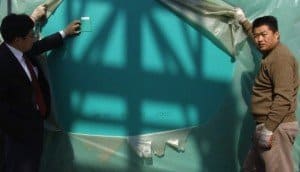
In this article I want to address one of the most frustrating situations in our job: when a factory tries to discredit us by accusing our inspector of seeking bribes.
Why some suppliers are upset about our reports
Our inspectors are trained to follow one standard that represents the average consumer tolerance in Western Europe and in the USA. They know what a major defect is, what a minor defect is, and when a very small defect should not be counted.
However, factories in Asia often have “their own quality standards”. And, of course, they know better about their business that an external quality controller. Or do they?
For example, I often got into heated discussions about what constitutes a major defect. Let’s say I find a hole in a garment. The factory will often tell me “but it’s not a big hole, it’s not very visible, so it’s not major”.
In this case, the supplier is wrong! As long as a yarn is broken, it is a major defect. The hole might be small now, but it will grow up when the garment is washed and worn. Who wants this kind of problem on their clothes? And would it reflect well on the brand?
Another source of conflict is the number of defects the factory considers “acceptable”. Our clients set an AQL limit (which, in 90% of cases, is the standard of 0/2.5/4.0). That gives us an objective limit on the number of defects that we will tolerate.
Some manufacturers are shocked to see that their production exceeds the AQL limits, sometimes two or three times. Either they have done a bad job, or the inspector is playing games with them, right? Some vendors are quick to jump to conclusions.
What these suppliers can do to discredit us
In the supplier’s mind, a very easy way to get rid of the inspection agency is to accuse us in front of the client. It usually goes this way:
Supplier: I have to tell you one important thing. Your inspection firm is not good. The inspector they sent in our factory was very, very tough. He created the defects by himself, and he took them in photos so that they look really big.Importer: Wow!! But why would they do that?Supplier: Our production manager thinks the inspector was looking for money. He wanted us to give him a bribe, to stop being so tough. But we are clean, and we don’t do this. We are confident in our quality.Importer: You are right to tell me about it. I will complain about it with my QC firm.
What do we do in such cases?
Obviously, we have to investigate the case, even if it concerns a long-time inspector that was never suspected or accused before.
In 100% of cases we found the same results in the follow-up inspection. The 1st inspector followed the procedure and reported his findings correctly.
Then, what does the supplier say?
Supplier: The inspection firm wanted to punish us for complaining. They sent another tough inspector who did the same as the 1st inspector, to protect their image and avoid admitting their mistakes.Importer: I really don’t know what to think…Supplier: We keep telling you, you should trust us rather than paying for quality control!Importer: Well, I do QC because of all the money I lost on your last container that you shipped without QC, have you forgotten it?
Conclusion
- Take what your suppliers tell you with a grain of salt. It can be in their interest to tell you lies.
- It is easy to pay another QC firm to do a spot check from time to time, just after an inspection by your usual QC firm.
No comments:
Post a Comment